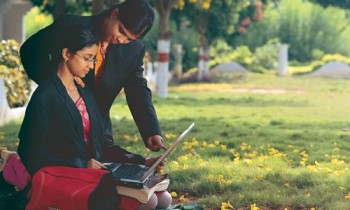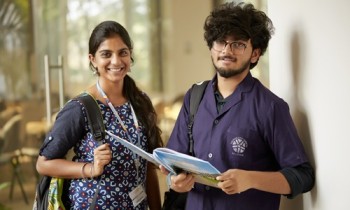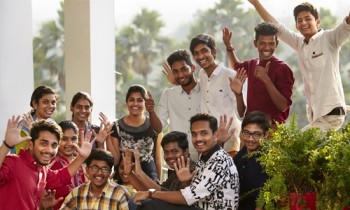- Course Description
- Course Structure
- Course Enquiry
Programme Educational Objectives (PEOs)
PEO 1: Graduates can excel in their professional career and higher studies with a strong foundation in Automobile Engineering.
PEO 2: Graduates can design and develop any automotive system with their acquired knowledge on automotive design, manufacturing and familiarity with CAD/CAE.
PEO 3: Graduates will have the capacity and willingness to become entrepreneur in the field of automobile engineering with a strong sense of responsibility to serve their profession and society in ethical manner.
PEO 4: Graduates will exhibit strong communication and interpersonal skills, broad knowledge and an understanding of multicultural and global perspectives to work effectively in multidisciplinary teams, both as team members and as leaders.
Programme Specific Outcomes (PSOs)
Engineering Graduates will be able to:
PSO 1 - Automotive System Analysis and Testing: Identify, formulate and solve Automobile Engineering problems and to work in research laboratory and multidisciplinary tasks in Automobile Engineering.
PSO 2 - Automotive Design and Development: Analyze, design, conduct experiments, and interpret data of an automobile system to meet the requirements of an automobile industry and to solve problems related to Automobile Engineering by using modern engineering tools and software.
Programme Outcomes (POs)
The graduates of Automobile Engineering will be able to:
PO 1: Engineering knowledge: Apply knowledge of mathematics, science, engineering fundamentals and an engineering specialization to the solution of complex engineering problems
PO 2: Problem analysis: Identify, formulate, research literature and analyze complex engineering problems reaching substantiated conclusions using first principles of mathematics, natural sciences and engineering sciences.
PO 3: Design/development of solutions:Design solutions for complex engineering problems and design system components or processes that meet specified needs with appropriate consideration for public health and safety, cultural, societal and environmental considerations.
PO 4: Conduct investigations of complex problems:using research-based knowledge and research methods including design of experiments, analysis and interpretation of data and synthesis of information to provide valid conclusions.
PO 5: Modern tool usage: Create, select and apply appropriate techniques, resources and modern engineering and IT tools including prediction and modelling to complex engineering activities with an understanding of the limitations.
PO 6: The engineer and society: Apply reasoning informed by contextual knowledge to assess societal, health, safety, legal and cultural issues and the consequent responsibilities relevant to professional engineering practice.
PO 7: Environment and sustainability: Understand the impact of professional engineering solutions in societal and environmental contexts and demonstrate knowledge of and need for sustainable development.
PO 8: Ethics: Apply ethical principles and commit to professional ethics and responsibilities and norms of engineering practice.
PO 9: Individual and team work: Function effectively as an individual, and as a member or leader in diverse teams and in multi disciplinary settings.
PO 10: Communication: Communicate effectively on complex engineering activities with the engineering community and with society at large, such as being able to comprehend and write effective reports and design documentation, make effective presentations and give and receive clear instructions.
PO 11: Life-long learning: Recognize the need for and have the preparation and ability to engage in independent and life- long learning in the broadest context of technological change.
PO 12: Project management and finance: Demonstrate knowledge and understanding of engineering and management principles and apply these to one's own work, as a member and leader in a team, to manage projects and in multidisciplinary environments.
| Programme Name | B.Tech in Bio-Technology | |
| Level | Under Graduation | |
| Programme Specific Enquiries | 0863-2344781 | |
| Admission Enrollment and General Enquiries | 0863-2344777, 1800-425-2529 |
|
| HoD Contact Number | 9440984668 | |












